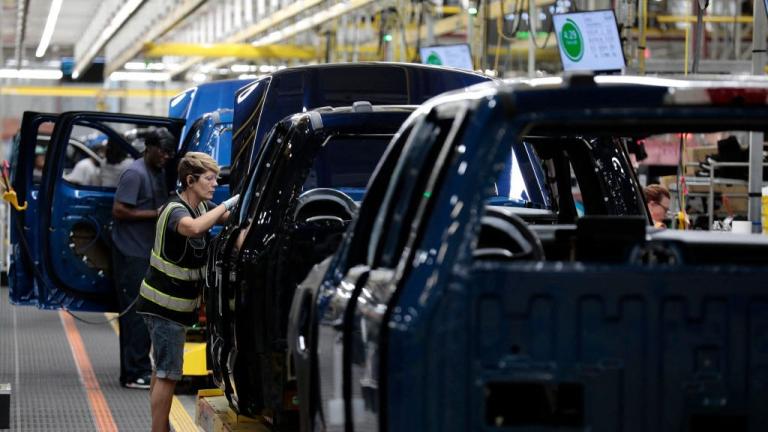The Republican party has a problem. They have based much of their power, over the last several decades, on the idea of ever-expanding (almost exclusively white) suburbs. The thinking was, as those suburbs become less and less dense — as one wag put it, the further away the houses are from each other — the more those suburbanites will vote Republican. As William Levitt, the builder of the first modern suburb after World War II said, “No man who owns his own house and lot can be a communist.”
Now that strategy is stalling, and I have a feeling that it will soon go into reverse. As James Howard Kunstler and others have argued, the mortgage meltdown is not simply the result of a a non-regulated financial system gone wild, but also the last gasp of growth of an automobile-and-oil-centered society. McCain couldn’t possibly solve the climate change or peak oil or industrial agriculture or ecosystem destruction problems, because these all require a greater efficiency of resource and energy use, which means a move towards a more urban lifestyle and the contraction of the Republican base. McCain simply won’t do it — exhibit A, he wants to kill Amtrak.
How did the Republican party get into this box?
The Republican party won the Civil War, and to the victors go the spoils. Not only did they become cozy with the emerging industrial behemoths of the period, but they also demanded fealty in return. The Republicans, however, had a long-term problem then, too — the base of the Democratic party, at least outside the South, consisted of the political machines that controlled the burgeoning cities (much of this history is based on the books of Walter Karp).
Since most of the population was rural, it didn’t pose much of a problem to the Republicans. When the territories of the Great Plains were ready for statehood, the Republicans figured that the more states the merrier, even though the region was sparsely populated. Instead of one Dakota, why not two? Then the Republicans would still have a head-start in the Electoral College and Congress.
As the Republicans tightened their claim as the Ruling Party, the Democratic machines, happy to continue their hold on the cities, stuck around on the national scene in case the Ruling Party messed up so badly that people wanted to throw the bums out (sound familiar?). But the last time we had an unregulated financial system, in the 1920s, it led to a great number of progressive social and political movements. Partly because of their pressure, FDR belatedly put together some of the parts of a social democratic society, such as old-age insurance and support for labor unions, that most European countries had by the 1920s.
What was a ruling party to do? It certainly helped that in 1952 Dwight Eisenhower became the first Republican president since the reviled Herbert “the fundamentals of the economy are strong” Hoover. Eisenhower had participated in the first transcontinental convoy of trucks in the 1920s, and then very competently led the large-scale invasion of Europe during WWII. Although he famously warned about the pitfalls of the military-industrial complex, he helped birth it, and he also presided over the creation of the Interstate Highway System without which the suburbanization of the U.S. would not have been possible.
Meanwhile, the aforementioned Levitt and many others started to construct suburbia, which allowed for a partial emptying out of the cities, containing by this time most of the population. This rush to one’s own “home sweet home” looked very tempting, considering that the so-called Highway Lobby, made up of the oil, car, highway-building, and real estate interests of the country, had worked to destroy what had been a world-class public transit system.
With buses and the remnants of the old-time Democratic party machines clogging up the cities, the American Dream emerged — a bigger car and a bigger single family house, placed within a bigger sprawl. The road to ecological and economic ruin had begun.
Socialism was firmly planted within the U.S. government in the form of a huge military budget, so the Federal government was able to effect a massive transfer of wealth from the “old” North and Midwest to the “new” South and Southwest, where mavericks and pioneers like Ronald Reagan and John McCain came from. And the vast subsidization of home ownership, in the form of the mortgage deduction and the laying of roads and other suburban infrastructure, led to a revived ruling Republican Party of Suburbia.
By now the vast majority of Americans can’t even conceive of living without an automobile, and they assume that a big single family house is the best place to raise a family. By 2006 of 124 million household units (table 951) [PDF], 77 million were single family detached, 7 million single family attached, and only 15 million households lived in buildings of 10 or more units.
The recent binge of house-building and mortgage-taking was the ultimate expression of this long-term process, and even though the Democratic Party basically went along, in typical fashion, the new exurbia was expected to be solidly Republican. I’m not saying that this was a Republican conspiracy — it was the final expression of a century-long trend, and the Republicans were waiting to benefit from it. This is why their legislators, and some of their constituents, almost shake with anger when the idea of the expansion of public transit is brought up — such a move threatens to make cities more livable, and urban residents seem to be more progressive and vote more Democratic.
While I appreciate the efforts of Al Gore, Bill Clinton, and some environmentalists to be bipartisan, this analysis suggests that the effort is doomed to failure, unless some parts of the Republican party accept the inevitable — that oil will soon become too expensive for everyday use, that climate change will bring too much disruption, that cities make more sense than sprawl, that manufacturing, and the unions which thrive within it, must be rebuilt. Then we can reconstruct the country in a bipartisan way, but not before. The Republicans, as presently constituted, are incapable of changing their wrecking ways.


